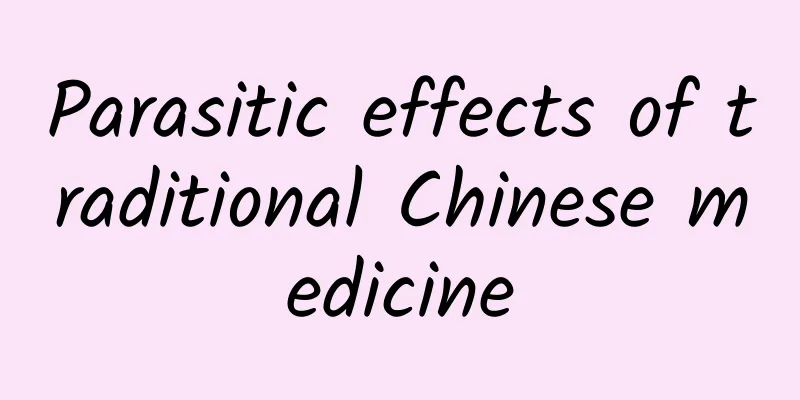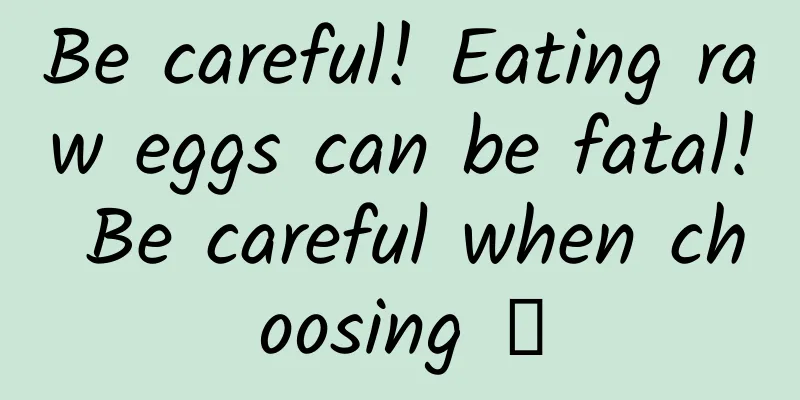Parasitic effects of traditional Chinese medicine

|
What are the medicinal properties of parasites in traditional Chinese medicine? I usually have very little knowledge and a small circle of friends, so I don’t know much about anything. A few days ago, a friend called me and asked me to accompany her to get Chinese medicine for her grandmother. She said she had a prescription and I just needed to accompany her. When getting the medicine, I saw a word called "parasite" on the prescription. I looked at it for a long time but didn't understand it, and I didn't have the courage to ask the chef who dispensed the medicine, so I had to go home and search on the Internet. I actually found the medicinal properties and introduction of parasites in traditional Chinese medicine. Jishe is the abbreviation of mistletoe. The efficacy and role of mistletoe Mistletoe, efficacy: acts on the liver and kidneys, functions and indications: rheumatism, and pregnancy maintenance. The efficacy and effects of mistletoe: The functions and indications of mistletoe: Mistletoe nourishes the liver and kidneys, strengthens the tendons and bones, eliminates rheumatism, dredges the meridians, benefits the blood, and calms the fetus. Mistletoe is used to treat sore waist and knees, weak muscles and bones, hemiplegia, athlete's foot, wind-cold-dampness arthralgia, miscarriage, hemorrhage, and postpartum milk retention. Mistletoe is used to treat miscarriage and fetal movement disorder. This product nourishes the liver and kidneys, nourishes blood and stabilizes the fetus. It can treat liver and kidney deficiency, fetal leakage and fetal movement disorder caused by Chong and Ren instability. It is often used in combination with mugwort, donkey-hide gelatin, Eucommia ulmoides, and Dipsacus asper. Mistletoe is used for rheumatism, pain in the waist and knees, etc. Mistletoe can dispel rheumatism, relax tendons and muscles, and treat rheumatic pain; it is especially good at nourishing the liver and kidneys and strengthening the tendons and bones. Therefore, it is especially suitable for those who suffer from liver and kidney deficiency, and pain in the waist and knees. It is often used together with Duhuo, Achyranthes bidentata, Eucommia ulmoides, Angelica sinensis, etc., such as Duhuo Jishe Decoction. The parasitic nature is bitter and sweet, and it is neutral. It has the effects of nourishing the liver and kidneys, strengthening the tendons and bones, removing rheumatism, dredging the meridians, replenishing blood, and calming the fetus. It is mainly used to treat low back and knee pain, weak muscles and bones, hemiplegia, athlete's foot, wind-cold-dampness arthralgia, miscarriage, hemorrhage, and postpartum milk retention. Chemical composition analysis showed that it contained effective ingredients such as flavonoids, oleanolic acid, and amyl alcohol. Pharmacological experiments have confirmed that it has antihypertensive, cardiotonic and diuretic effects, and has a dilating effect on the isolated rabbit ear blood vessels with cholesterol-induced arteriosclerosis. Based on long-term clinical experience in traditional Chinese medicine, it is concluded that parasites have the characteristics of not only eliminating rheumatism, but also nourishing the liver and kidneys and strengthening the tendons and bones. For arthritis, weak tendons and bones, and sore waist and knees caused by blood failure to nourish the tendons, and liver and kidney deficiency, it is often used together with Duhuo, Eucommia ulmoides, Achyranthes bidentata, and Angelica sinensis, such as Duhuo Jishe Decoction; it also has a stabilizing effect on the fetus, and is used for fetal leakage and fetal movement disorder, and is often used together with Dipsacus asper, donkey-hide gelatin, and Artemisia argyi. The chemical components contained in parasites are divided into types according to their varieties: the stems and leaves of mistletoe contain oleanolic acid, β-amyrin, inositol, flavonoids, etc.; the leafy stems and branches of mistletoe contain quercetin and quercetin. Pharmacological effects: Mistletoe has antihypertensive effects; Viscum album has diuretic, antihypertensive and antiviral effects. Rheumatism and cold pain tablets produced by Tianjin Tongrentang Pharmaceutical Factory. Its functions are mainly to dispel wind and cold, activate meridians and remove dampness, and strengthen the body. Clinically, it mainly treats various types of rheumatic joint pain, back pain, numbness of limbs, etc. Parasitism comes from two plants, mistletoe and mistletoe, of the Loranthaceae family. They often parasitize on trees such as pear, elm, birch, maple poplar, and liquidambar. Mistletoe may be an inconspicuous medicinal plant in China. After reading this, everyone has understood the parasitic effects of traditional Chinese medicine. The knowledge of traditional Chinese medicine is complex and difficult to understand. It is not something that a layman like me can understand all at once. It requires a long time to figure it out. When taking traditional Chinese medicine, do not eat cold or irritating food, and do not take other western medicines, as these will have a bad effect on the body. |
<<: What are the types of Chinese herbal lipid-lowering drugs?
>>: Recipe for quick miscarriage
Recommend
The "health killer" that is more terrible than sugar and alcohol is hidden in the food you often eat
Now many people know the dangers of excessive sug...
A "pyramid" appeared in Anlong, Guizhou? The special local landform created a wonder!
Edit: Corner Recently, several mountains resembli...
The efficacy and function of glutinous rice balls
We can often see glutinous rice balls in daily li...
What are the main effects of the Chinese medicinal material Acorus calamus
Acorus is a very common herb. There are three mai...
What kind of fish are the dried fish sold in supermarkets for one yuan a bag made of? Is it safe to eat?
Expert of this article: Pa Lize, chief physician ...
If you punch a hole through the Earth and jump in, you won't pass through the Earth, nor will you stop at the center of the Earth.
The earth is a celestial body that is almost sphe...
Astronauts of Shenzhou 13 are coming home soon! Why did they use the Dongfeng aircraft for the landing site this time?
"The landing site system will play an import...
Do you take tens of thousands of steps every day? These "foot exercises" are really not suitable for you
Author: Tang Qin, Deputy Secretary-General and Re...
Where is the best place to get wild Dendrobium candidum
Huoshan Dendrobium officinale is a precious medic...
Why are airplane windows rounded instead of square?
Nowadays, airplanes have become an indispensable ...
The efficacy and function of black blood vine
Traditional Chinese medicine has always been the ...
The efficacy and function of small plate wood
Since Chinese medicine has fewer side effects, mo...
What are the herbs for nourishing liver and kidney?
As people's work pressure continues to increa...
Latest discovery: There are not only "three bodies" in the universe, but also terrible "devourers"
Recently, The Three-Body Problem has become a hot...
The efficacy and function of sweet tea vine
With the development of society and the close int...









